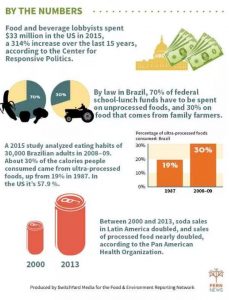Join Health Affairs for a virtual conversation between me and Angela Odoms-Young of Cornell University discussing the evolution of US food and nutrition policy, the current policy landscape, and thoughts on what lies ahead. It’s at 1:00 p.m. EDT. To join the Webinar, click here.
Brazil’s food revolution is working!
Bridget Huber of The Food and Environment Reporting Network (FERN) has produced a don’t-miss” article in The Nation: “Welcome to Brazil, where a food revolution Is changing the way people eat: How the country challenged the junk-food industry and became a global leader in the battle against obesity.”
As she explains, Latin America is leading worldwide opposition to food industry marketing, and much is happening in Brazil.
She writes about the advocacy work of Carlos Monteiro, Professor of Nutrition in the School of Public Health, University of Sao Paolo, who says:
The local food system is being replaced by a food system that is controlled by transnational corporations…this dietary deterioration doesn’t just harm bodily health but also the environment, local economies, and Brazil’s rich food traditions. We are seeing a battle for the consumer.
She further explains:
Over the last 30 years, big transnational food companies have aggressively expanded into Latin America. Taking advantage of economic reforms that opened markets, they’ve courted a consumer class that has grown in size due to generally increasing prosperity and to antipoverty efforts like minimum-wage increases and cash transfers for poor families. And as sales of highly processed foods and drinks have plateaued (and even fallen, in the case of soda) in the United States and other rich countries, Latin America has become a key market…In recent years, Brazil has inscribed the right to food in its Constitution and reformed its federal school-lunch program to broaden its reach while bolstering local farms.
And in 2014, the Ministry of Health released new dietary guidelines that made healthy-food advocates across the world swoon [I did a post on them when they were released]. Monteiro helped lead the team that wrote them; the guidelines transcend a traditional nutrition-science frame to consider the social, cultural, and ecological dimensions of what people eat. They also focus on the pleasure that comes from cooking and sharing meals and frankly address the connections between what we eat and the environment.
Huber’s investigative report is long and detailed, and well worth the read.
And it comes with a great graphic comparing the situation in Brazil with that of the U.S. (this is just an excerpt):

Those of us advocating for food systems that are healthier for people and the planet have much to learn from our colleagues in the South.

